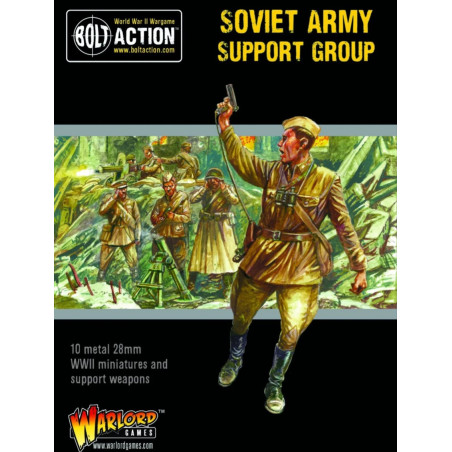- Out-of-Stock




Scale: 28mm - 1/56th
4 Infantry
2 Artillery Pieces/War Machines
6 Crew
Metal
Made to Order
While we hold as much stock as possible, on occasion this product may need to be cast especially for you by our expert staff. If your order includes this item, it may take a few more days before we ship it.
Requires Assembly
This product is supplied unassembled and unpainted. Glue and paints not included.
This set contains:
1 x Soviet HQ
1 x Soviet Medium Machine Gun Team
1 x Soviet Medium Mortar Team
Soviet HQ
Like the soldiers they commanded, many Soviet officers were inexperienced and lacked training at the beginning of the Great Patriotic War. Stalin’s ruthless purge of the officers of the Red Army in 1937 had denuded the organization of leadership and left deep scars in the survivors’ minds. Throughout the war, showing initiative was seen as a dangerous trait, and most Soviet officers would follow their orders to the letter even if they meant marching their men to certain death.
Soviet operational leadership improved immeasurably over time, but the heavy casualties endured by the Red Army indicates that overall battlefield control remained a blunt instrument. A great reliance was placed on forward planning, timetables and pre-set objectives to overcome shortcomings. An officer unit consists of the officer himself and can include up to two other men acting as his immediate attendants. Soviet officers can be rated as Inexperienced, Regular or Veteran.
Soviet Medium Mortar Team
The standard Russian medium mortar of the war was the 82- PM-41 or 82mm battalion mortar Model 1941. This served alongside the otherwise similar 82mm Model 1937. Both were very effective and accurate weapons with a range of about 3,000 yards. 82mm mortars were regarded as artillery rather than infantry weapons by the Russians and were usually massed together in batteries for battalion-level support.
Soviet Medium Machine Gun Team
The Red Army used the venerable Maxim Model 1910 as its medium machine gun throughout the war, the very same weapon that had served the Tsarist army in World War I. It was a capable weapon that could be tripod-, sledge- or wheelmounted and was often given a useful shield to help preserve the crew. The Maxim was so heavy and cumbersome, however, that, unlike most other Soviet weapons, the Germans seldom made use of captured examples. The Maxim was slowly replaced by the newer, lighter but equally effective SG43 model machine gun, which was also usually deployed on a small, wheeled mount with a gun shield.